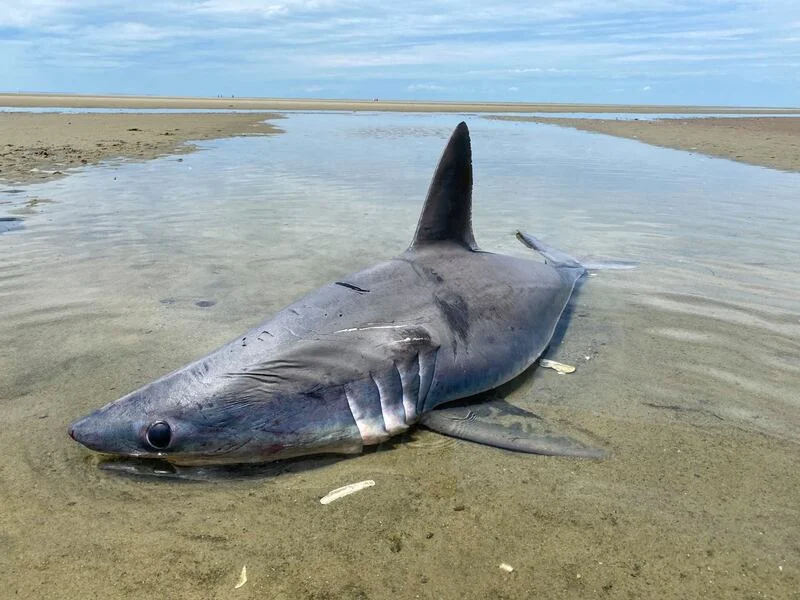Overview of the Basking Shark Stranding in Cape Cod
Basking Shark stranded Cape Cod: A rare and tragic event unfolded recently when a Basking Shark — one of the ocean’s most majestic and gentle giants — was found stranded on the shores of Cape Cod, Massachusetts. The massive creature drew crowds of onlookers, marine biologists, and rescue teams who attempted to save it.
The Basking Shark (Cetorhinus maximus) is the world’s second-largest fish, known for its calm nature and plankton-eating habits. It’s a protected species in many countries, including the United States, because of its declining population.
Unfortunately, despite rescue efforts, the stranded Basking Shark on Cape Cod could not survive, raising questions about why these gentle giants are increasingly washing ashore and what can be done to prevent similar incidents.
Details of the Cape Cod Incident
According to reports from local marine authorities and the New England Aquarium, the Basking Shark was discovered stranded on a Cape Cod beach early in the morning by local residents. Witnesses described the shark as being over 20 feet long and weighing several tons.
Marine biologists and volunteers from organizations such as the Center for Coastal Studies responded quickly. They attempted to keep the shark wet and stable while assessing whether it could be safely moved back into deeper waters. Unfortunately, despite continuous efforts, the shark was too weak to survive the ordeal.
Following its death, experts conducted a necropsy (animal autopsy) to determine the cause of the stranding. Initial results suggested potential factors like:
-
Disorientation due to changing ocean temperatures.
-
Illness or internal injury.
-
Entanglement in fishing gear or nets prior to beaching.
The incident is part of a growing number of large marine animal strandings along Cape Cod, a region known for its complex tides and shallow sandbars that can easily trap large sea creatures.
Why Do Basking Sharks Get Stranded?
While each stranding is unique, marine scientists have identified several possible reasons why Basking Sharks strand on beaches like those in Cape Cod.
1. Disorientation from Climate Change
As ocean temperatures rise, plankton distribution shifts, forcing Basking Sharks to migrate into unfamiliar areas. When they follow food sources into shallow waters, they can become trapped by tides or sandbars.
2. Injuries and Illness
Some stranded sharks suffer from parasites, infections, or injuries that affect their navigation and buoyancy. A weakened shark may lose its ability to stay in deep water.
3. Human Activities
Entanglement in fishing nets, ship collisions, and underwater noise pollution can also lead to strandings. Once trapped or injured, the sharks may drift toward shore and become stranded.
4. Natural Causes
Occasionally, strandings occur due to natural oceanic currents or storms that push marine animals closer to the coast.
Cape Cod’s geography — with its shallow, shifting sandbanks and strong tides — makes it one of the most common locations for marine strandings in North America.
How Marine Experts Respond to Shark Strandings
When a Basking Shark becomes stranded, marine rescue teams follow a careful response plan to protect both the animal and the environment.
Step 1: Assessment
Experts assess the shark’s health, breathing rate, and stress levels. If the shark is still alive, they take immediate steps to keep its skin wet and gills oxygenated.
Step 2: Communication
Authorities such as the Massachusetts Division of Marine Fisheries (DMF) and the NOAA Fisheries Service are alerted. They coordinate with local responders for equipment and safety measures.
Step 3: Attempted Refloatation
If conditions allow, teams use large tarps, straps, or boats to guide the shark back into deeper water. However, this is extremely challenging due to the animal’s size and stress levels.
Step 4: Data Collection and Research
If the shark cannot be saved, a necropsy is performed to determine the cause of death. Scientists also collect tissue and DNA samples to support ongoing conservation research.
These responses are crucial in helping researchers understand the broader environmental and ecological issues leading to Basking Shark strandings.
The Importance of Protecting Basking Sharks
The Basking Shark plays a critical role in marine ecosystems as a filter feeder, helping to maintain the balance of plankton populations in the ocean. Despite their enormous size, they are harmless to humans and feed mainly on tiny plankton, krill, and small fish.
Unfortunately, Basking Sharks are classified as “Endangered” by the International Union for Conservation of Nature (IUCN). Their population has declined due to overfishing, accidental bycatch, and environmental changes.
Protecting these gentle giants requires:
-
Monitoring migration patterns to understand their movements.
-
Reducing plastic pollution and fishing waste in oceans.
-
Educating the public about their importance in marine ecosystems.
-
Supporting global conservation programs like the Shark Trust and the IUCN Shark Specialist Group.
Events like the Basking Shark stranding in Cape Cod serve as a reminder of the fragile relationship between humans and marine life — and the urgent need to protect ocean biodiversity.
Community and Environmental Response
The Cape Cod community has a long history of responding compassionately to marine strandings. In this case, locals, tourists, and researchers came together to assist rescue teams and document the event for scientific purposes.
Environmental groups are now calling for:
-
Increased research funding for shark migration studies.
-
Better monitoring systems to track large marine animals near coastlines.
-
Public education campaigns on what to do when encountering stranded marine wildlife.
Witnessing such a magnificent creature in distress has deeply impacted the community, reinforcing the importance of ocean conservation and sustainable coexistence with marine species.
Conclusion
The Basking Shark stranded in Cape Cod highlights both the beauty and fragility of ocean life. As the second-largest fish on the planet, its stranding serves as a powerful reminder of the challenges marine species face in a changing environment.
While the event ended tragically, it has sparked renewed awareness about climate change, pollution, and marine conservation. Through collective efforts — from research to community education — we can help ensure that gentle giants like the Basking Shark continue to thrive in our oceans for generations to come.
FAQs
1. What is a Basking Shark?
A Basking Shark is the world’s second-largest fish, known for feeding on plankton and being harmless to humans.
2. Why did the Basking Shark strand in Cape Cod?
Possible causes include disorientation, injury, or changes in ocean temperatures and tides.
3. Can stranded Basking Sharks be saved?
Rescue teams often try to refloat them, but due to their size and health conditions, survival is not always possible.
4. Are Basking Sharks endangered?
Yes, they are listed as Endangered by the IUCN due to overfishing and environmental threats.
5. How can people help protect them?
By supporting ocean conservation efforts, reducing pollution, and reporting stranded marine animals to local authorities.





